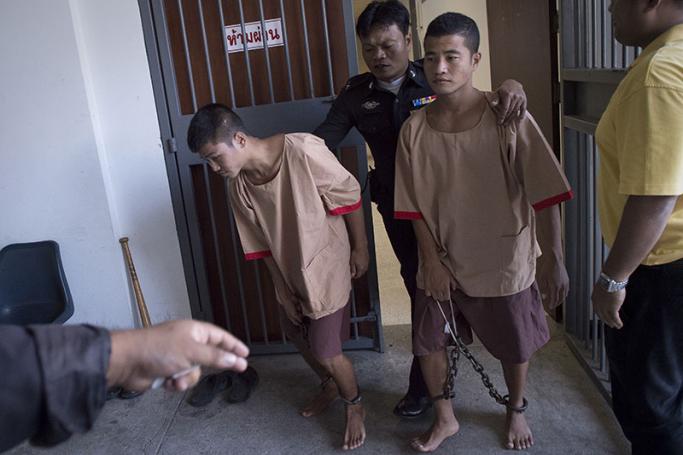The defence in a case where two Myanmar nationals were convicted of the brutal murders of two British backpackers in Koh Tao in September 2014, will file their final appeal with the Supreme Court Monday.
The defence will argue against the reliability of forensic evidence and legality of the investigation process in their appeal, said Nakhon Chompuchat, head of the defence team.
Lawyers of 22-year-olds, Zaw Lin and Win Zaw Htun, the latter also known as Wai Phyo, will file the appeal with the Supreme Court against the Appeal Court's ruling in March upholding the death sentence handed down to the two migrant workers for the rape and murder of Hannah Witheridge, 23, and the murder of David Miller, 24, on the resort island on Sept 15, 2014.
Mr Nakhon told the Bangkok Post he will submit a 300-page appeal to the Supreme Court Monday, focusing on two key arguments.
He said a key issue the defence lawyers will argue is the forensic procedure and autopsy results that confirmed a match in the DNA found in samples collected from Witheridge's body and the DNA of the defendants.
According to the Appeal Court ruling, the results were in line with international standards and the defendants committed the crime "without a doubt", Mr Nakhon said.
He said the defence lawyers would point out to the Supreme Court that there still remained some "doubt" regarding the forensic evidence, including the DNA test, as the sample collection, analysis and reporting procedures may not be fully reliable.
He said the defence would argue to the Supreme Court that those procedures were not in line with "international standards of forensic science".
In addition, the lawyer said his team would argue the official autopsy results were not submitted to the lower courts, only verbal statements of witnesses and experts were given. So, there are doubts over the autopsy results as well, the lawyer said.
Mr Nakhon said poor handling and problems with chain of custody regarding the DNA samples during the police investigation process would be another issue they would raise in their appeal.
The defence team believes the police interrogation process was unlawful, he said.
Initially, he said, the defendants were questioned as witnesses.
But it turned out the police were later in possession of their confessions over the rape and murder.
The defendants had no lawyer participating in the interrogation, he said.
In addition, the defendants were never properly advised of the murder charges, nor their rights under Thai law. They were also not provided with a proper interpreter during the process.
The defence lawyers will point out the defendants' confessions during the investigation process are unreliable as they were given under duress and intimidation, said Mr Nakhon.
Both defendants later retracted their confessions.
"Given such a suspicious interrogation process, we will ask the court not to accept its results," he said.
Mr Nakhon said representatives of the Myanmar government met his team on Tuesday last week to coordinate with them and also extend their gratitude to the Lawyers Council of Thailand for providing legal help to the Myanmar defendants.
On Thursday, the lawyers met the defendants at Bang Kwang Central Prison to read to them the details of the appeal and get their signature of approval.
The defendants said they still hope for justice, said Mr Nakhon.
In March, the Appeal Court Region 8 upheld the death sentence for both migrant workers.
The court said the defence team's argument regarding the absence of certain evidence was not grounds for the court to question the handling of the investigation.
According to the court, numerous steps were involved including photo-taking at the crime scene and also during the examination of evidence.
It was impossible to document or take photos of the entire procedure, it said.
The fact the prosecution did not submit some photos as evidence, such as samples collected from Witheridge's private parts, was not enough to question the handling of the case.
According to the court, the sentence was reached not based on a single photo or document, but several pieces of evidence that were connected.
http://www.bangkokpost.com/news/crime/1309887/defence-to-appeal-koh-tao-...
You are viewing the old site.
Please update your bookmark to https://eng.mizzima.com.
Mizzima Weekly Magazine Issue...
14 December 2023
New UK Burma sanctions welcome...
13 December 2023
Spring Revolution Daily News f...
13 December 2023
Spring Revolution Daily News f...
12 December 2023
Spring Revolution Daily News f...
11 December 2023
Spring Revolution Daily News f...
08 December 2023
Spring Revolution Daily News f...
07 December 2023
Diaspora journalists increasin...
07 December 2023
EU official bemoans 'unpredictablity' of Chinese law on Beijing trip












